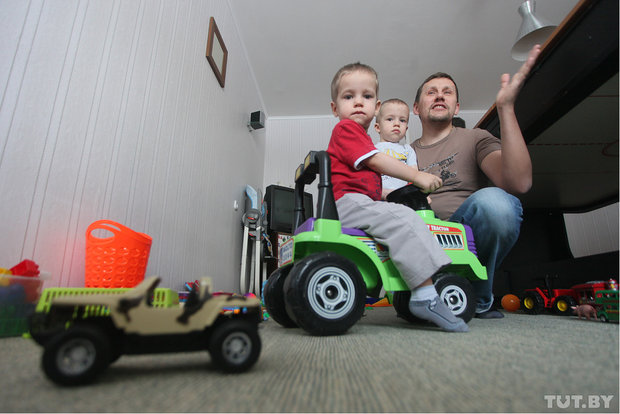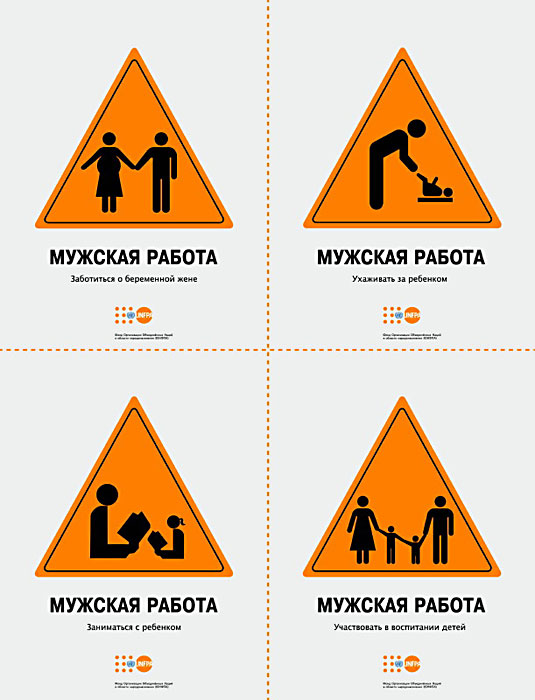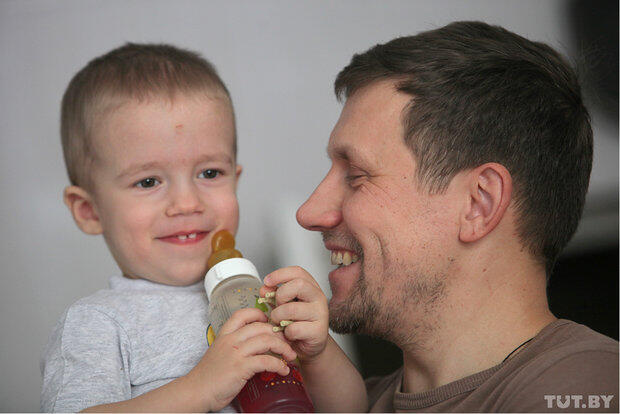February 23 is the only men’s holiday in the calendar. As a rule, everyone mentions the classic merits of a man: strength, bravery, responsibility.
Many understand responsibility as a duty of the protector – a dad, a husband – to provide for the family.
Everything changes fast in today’s world, including the perception of the role of a man in the family.
"Involving men in the process of taking care and upbringing of children beside from mere providing material support is necessary both for the general well-being of the family and the child and beneficial for the demographic situation in the country.
In economically developed countries and well-off families the key factor for a woman to decide to have more than one child is the extent of the future father’s involvement in the process of upbringing children”, says Tatyana Haplichnik, Programme Analyst, UNFPA.
In the archives of message board discussions for future parents of five years ago there is not even a hint of discussing the topic of “Who is to take a parental leave”. Then there was the only response – mum. No one even considered the possibility of a dad staying with the child under three years. During these five years everything has changed, and this topic has not only appeared on Internet sites but has also collected hundreds of comments. For some years now according to the Labour Code of the Republic of Belarus not only women but also working fathers or other child’s relatives who actually take care of the child may take parental leave until the child is three years old, with a state monthly benefit paid.
The first country to legally establish the right of men to take a parental leave was Norway: in the early nineties the decision was taken that both mothers and fathers can take a parental leave. For example, a father can have a special six-week paternity leave and share with his wife the shared parental leave: 44 weeks with 100% salary or 54 weeks with 80% salary paid.
The Norwegian authorities sought to ensure gender equality in all spheres of life and improve the demographic situation in the country. Norway has become one of the few countries where birth rate ¹ as of today is at the level of mere reproduction (birth / death ratio). For example, the cumulative birth rate in Norway for 2011 is 1.77, versus Belarus where for the same period this rate is 1.51.
If after the birth of a child grandparents leave work to look after their grandchildren, this causes no indignation or surprise. But if a dad decided to take a parental leave he may face all kinds of situations, as bad as threats of dismissal by his employer.
According to the data of the Ministry of Labour and Social Security 2453 fathers were paid child care allowance in 2011. While data for 2012 is being calculated we decided to find out what are the motives behind men taking a paternity leave, what problems they face and how specialists recommend dealing with these problems.
Psychologists name two main reasons for men to take a paternity leave: personal (health, family situation, etc.) and financial, which is supported by the responses of the interviewed fathers.
“The decision was taken due to a number of reasons”, said Konstantin Tomashevich, the father of twins. “The main reason was the young mother’s health. To bear healthy twins (the boys were three kilograms each at birth) is a serious stress for one’s spine. She has back problems now. The doctors insisted that she must not strain her back or lift things weighing over three kilos. So we decided that until the boys walk well I will stay with them, and my wife will go back to work and will have several courses of back therapy”.
The other father Vadim (36, one child) has a different situation: “It is not that my wife has a more well-paid job but rather it is more stable and prestigious, plus she has better prospects for career development as compared to me. That is why the decision was made that I will take a parental leave”.
Roman Kryuchkov, a family psychologist, thinks that on the whole there is a stereotype in the society that fathers can only take a parental leave because of financial reasons: “It is important to give birth to a child and secure it financially, however, it is not less important to comply with the role of a parent and a model; and this cannot be done when you are permanently at work. In Sweden there is a mandatory condition of sharing parental leave between parents. And this is a very good policy, as it is especially during the first three years when the foundations for the child’s development are laid; and both parents must be equally involved in this. If fathers understand that they are not only the breadwinners but are equally involved in the process of children’s upbringing with the mothers, they will not at all be ashamed of taking a paternity leave. That is why we should try to have the situation when Belarusian parents understand this and make their choice independently of external factors but just considering the needs of their child”.
The Japanese authorities recognize the important role of the father in the family. According to the statistical data, an average Japanese man spends maximum 48 minutes a day at home and with his family, which, in the opinion of the state officials, contradicts the traditional ideas of the Japanese about the role of men in the upbringing of children. That is why the authorities decided that municipal employees take a compulsory 40-day paternity leave.
This being said, French and British fathers agree to take a paternity leave just because they love their baby and their wife. According to the survey conducted by the French Society of Social Studies almost 70 per cent of French men approve of a paternity leave and more than 76 per cent of French women do so, who said that they “will be happy” to share baby care with their husband right after the birth of the child”. Nowadays dads in France are allowed to take a two-week paternity leave, but in the future it is planned to make a “dad’s leave” longer.
The British authorities have established by law the right of both the father and mother to an annual paid parental leave for both parents. Earlier fathers in Britain were allowed to take a two-week unpaid parental leave after the child's birth. Now a father can spend full six months with the baby (mum spends another six months with the baby).
It should be mentioned that according to the Law of the Republic of Belarus “On state benefits to the families with children”, which has been in force since January 1, 2013, handicraft workers, individual entrepreneurs and lawyers are no longer allowed to take paternity leave. In this situation the mother or other relatives must take charge of the child until it is three years old. But if the baby has only a father, the allowance will be paid taking into consideration that the child has only one parent.
Dads themselves are of a different opinions as regards the most popular – financial - reason for taking a paternity leave.
“Such decision is difficult to predict beforehand. Your life may change cardinally in a moment. But the family must get ready to the birth of a child. Both mum and dad should become parents consciously. It is difficult to give advice as every human being is unique and so is every family. The only thing here is: make a decision specifically for your family and considering your situation, do not pay much attention to the traditions or customs in the society. For me the health of my wife was more important”, says Konstantin Tomashevich, the father of twin boys, sharing his experience.
When an employer learns that a father intends to take a paternity leave, he or she quickly estimates the lost profits and is prepared to take extreme measures to avoid this. Some dads even have to defend their decision in court.
“The overwhelming majority of managers not only have a negative attitude but also start a conflict after which the employee is “blacklisted” forever, he gets fired, and in future has no way of finding a job if it is rare.
This was the situation with me when I was a pilot. They said to me quite plainly: “We do not need fathers, we need workers. Quit.” tells Oleg Bakulin, Chairman of the Board of the NGO Fathers’ and Children’s Rights Protection.
Neither the dads we interviewed were on very friendly terms with their management on leaving:
“My lady manager laughed when I said that I would take a paternity leave, and during the leave she kept reminding me that my work was waiting for me”, recalls Vadim, the father of the boy.
“When my work colleagues (men) found out about the situation and the decision taken they expressed support and understanding, but would not venture to do anything like that themselves (as they said). Well, my director (a private company) just had to agree that I take this leave. There is law…” says Konstantin Tomashevich, the father of the twins.
Vassily Pron, Director of Kvadratny Apelsin (Square Orange) Training Centre, explains the conflict between the fathers and the employers as follows: “The trick here is that dads on parental leave are still unusual, there is no such concept in the value system. That is why the decision of a man to take a paternity leave is perceived negatively”.
Roman Kryuchkov recommends that the men who decided to take a paternity leave but faced threats from their employer should consult a lawyer right away, as the company would hardly choose to violate the law.
Psychologists say that upbringing of a child by a dad is beneficial for the baby, as it is more even. Men are notably more psychologically and emotionally stable, they do not suffer drastic mood changes or postpartum depression. The children brought up by fathers become more rational and logical as compared to their peers brought up mainly by mothers.
Despite the great contribution of fathers into a baby’s development fathers perceive the prospect of taking a paternity leave in different ways.
Konstantin Tomashevich, the father of the twins says: “Everything will be different. We will change, and the situation will change. But if I have to go through it again, I will surely do it, gladly”.
The other dad, the father of a boy, has a different opinion of the situation: “I gained more than I lost, I have enriched myself with new experience, have seen a lot of my drawbacks, and I have grown to value the society more. Considering all positive aspects of staying on a paternity leave with one’s baby I personally would recommend entrusting this with an experienced nanny rather than the dad who is torn away from his job; this would be better for both of them. The man created by the evolution to get material benefits has been increasingly losing this status in the modern world. In the world of artificial goods and work equally accessible for men and women the process of a man becoming a “nanny” is irreversible and inevitable. We wish him luck in this crucial, important and anything but simple work!"
When taking the final decision whether you should take a paternity leave the UNFPA Resource Centre recommends that you first of all consider which is more important for you: the opinion of outsiders or the happiness and health of your baby.
And if you have already ventured on this but doubt whether you have done the right thing, the psychologists recommend the following:
1. Appreciate this opportunity to be with the child during the day, as the fathers who spend most of their time at work can only envy you.
2. Feel the significance of the mission of upbringing your child as an opportunity to implement a successful project.
3. Learn from your child to enjoy life, be sincere and affectionate – women value these qualities so much. Maybe the paternity leave will help you become the best husband.

A baby makes contact with its parents as early as in the first hours of life, that is why the sooner you get involved in the upbringing of your child, the better relationship you are going to have in the future, as opposed to the dads who are at work for days on end.
------------------------------------------------------------------
¹ average number of children that would be born to one woman in a hypothetical generation throughout her life, if the current birth rate remains unchanged, independent of death rate or the changes in the age structure



